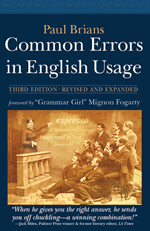Few people will care which spelling you use, but there are some interesting points to observe about “blonde” and “blond.”
In the original French and in traditional English usage, “blonde” is female and “blond” is male: it’s “a blonde woman” and “a blond man.”
Hair itself has no gender in English, but we usually use the female spelling in the phrase “blonde hair.” Similarly, furniture made of light-colored wood is most often referred to as “blonde.”
When someone is referred to as “a blonde” we almost always think of a woman, even if the spelling used is “a blond.” Feminists point out that typically only women are reduced to their hair color in this way, and that it can be offensive. Note that there is a whole category of “blonde jokes” stereotyping these women as air-headed. However, when the word refers specifically to hair color in a useful way, no one is likely to object: “She is a blonde with very light skin, so she has to use a lot of sunscreen.”
Oddly, we rarely use the French masculine spelling brunet. Anyone can have brunette hair, although “brunettes” like “blondes” are usually assumed to be women.
Back to list of errors

BUY THE BOOK!
